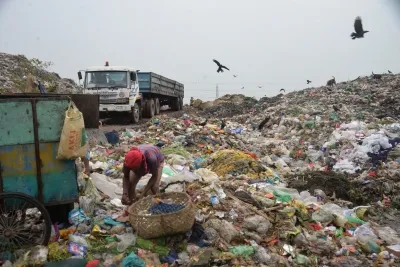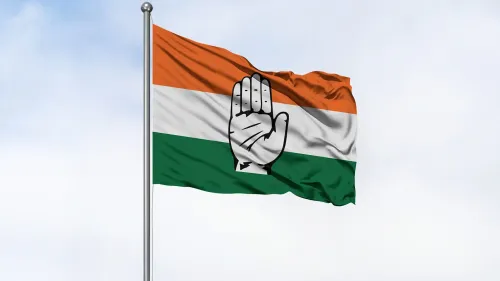Are Hopes Fading in Final Talks on the Plastic Treaty in Geneva?

Synopsis
Key Takeaways
- Urgent need for a legally binding treaty on plastic pollution.
- Delegates from 184 nations are working to finalize the treaty.
- Concerns over corporate influence in negotiations.
- Significant health risks associated with plastic pollution.
- Indigenous rights emphasized in treaty discussions.
New Delhi, Aug 10 (NationPress) At the midpoint of the resumed fifth session of the Intergovernmental Negotiating Committee (INC-5.2) in Geneva, aimed at crafting a legally binding international instrument addressing plastic pollution, including its impact on the marine environment, delegates are urging expedited efforts to create a treaty that can genuinely eliminate plastic pollution.
The International Indigenous Peoples’ Forum on Plastics (IIPFP) has called upon governments to respect their rights in all treaty aspects, as recognized by the UN Declaration on the Rights of Indigenous Peoples (UNDRIP).
During the stocktaking plenary on Saturday, delegates evaluated an “assembled text” and deliberated on the negotiation process for the remaining four days.
In Geneva, representatives from 184 nations, including a robust delegation from the Pacific Small Island Developing States (PSIDS), which continue to advocate for a highly ambitious treaty addressing the full lifecycle of plastics, are striving to finalize the first-ever legally binding treaty on plastic pollution.
The urgency of these discussions has been underscored by a recent study in The Lancet, labeling plastics as a “serious, escalating, and under-recognized hazard to both human and planetary health.”
In 2023, global plastic production soared to 436 million metric tons, with plastic trade exceeding $1.1 trillion, representing five percent of global merchandise trade. However, a staggering 75 percent of all plastics ever produced have turned into waste, much of which seeps into oceans and ecosystems, according to the UN Conference on Trade and Development.
This escalating imbalance poses significant threats to public health, food systems, ecosystems, and long-term development, particularly in small-island and coastal nations.
Moreover, the average Most Favoured Nation (MFN) tariffs on plastic and rubber products have plummeted from 34 to 7.2 percent over the last three decades, making fossil fuel-based plastics artificially cheap. In contrast, natural alternatives like paper, bamboo, natural fibers, and seaweed encounter average MFN tariffs of 14.4 percent.
According to the Earth Negotiations Bulletin, delegates concurred that the negotiations are progressing too slowly. Suggestions included Colombia’s proposal for full days of informal negotiations, while the EU and China encouraged the INC Chair to pursue “shuttle diplomacy” to expedite progress.
Concerns over the “unchecked” expansion of the text were voiced, with Fiji advocating for a time-bound process to streamline discussions. Several delegations requested a dedicated dialogue on scope.
Despite the remarkable attendance of Indigenous Peoples, an analysis by the Center for International Environmental Law (CIEL) highlights the disproportionate sway of polluting industries in these negotiations. At least 234 lobbyists from the fossil fuel and chemical sectors—a new record—have registered for the fifth and final session of INC-5.2.
This notable presence of lobbyists raises alarms regarding corporate influence at a critical juncture, as negotiators are expected to finalize the treaty text and lay the groundwork for its eventual adoption.
In a written statement to the plenary, the Alliance of Small Island States (AOSIS), representing the interests of 39 small island and low-lying coastal developing states, firmly advocated for a treaty founded on accountability, ambition, and action.
The ongoing negotiations follow INC-5, held in November-December 2024 in Busan, Korea, preceded by four previous sessions: INC-1 in Punta del Este (November 2022), INC-2 in Paris (June 2023), INC-3 in Nairobi (November 2023), and INC-4 in Ottawa (April 2024).
“Plastic pollution is already present in nature, our oceans, and even our bodies. If we persist on this path, the entire world will be overwhelmed by plastic pollution—leading to severe consequences for our planetary, economic, and human health,” stated Inger Andersen, Executive Director of UNEP.
“However, this bleak future is not inevitable. Together, we can tackle this challenge. Reaching an agreement on a treaty text is the first step towards combating plastic pollution for all, everywhere,” Andersen emphasized.
Since Busan, several informal ministerial meetings, regional consultations, and heads of delegations meetings have occurred in the lead-up to INC-5.2.
“We are gathered today to fulfill an international mandate. This is a unique and historic opportunity for the global community to bridge differences and find common ground. This is not merely a test of our diplomacy; it is a test of our collective responsibility to protect the environment, ensure human health, foster sustainable economies, and stand united with those most affected by this plastic pollution crisis,” remarked Luis Vayas Valdivieso, Chair of the INC.
As of the opening day on August 4, over 3,700 participants had registered for INC-5.2, representing 184 countries and more than 619 observer organizations.
(Vishal Gulati can be contacted at vishal.g@ians.in)









